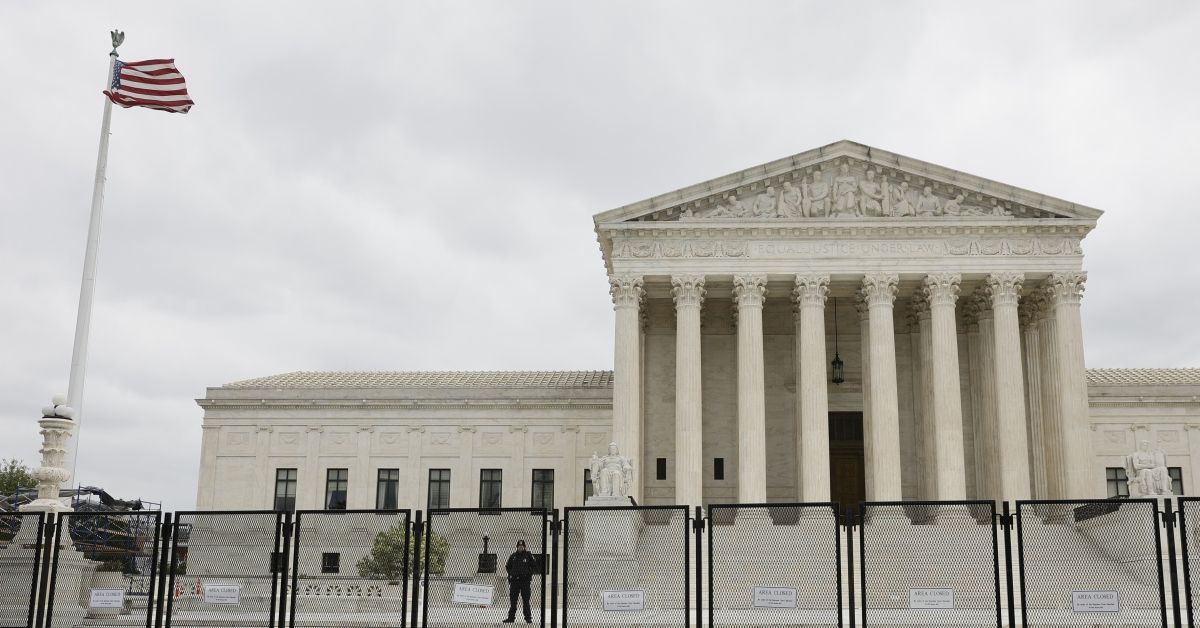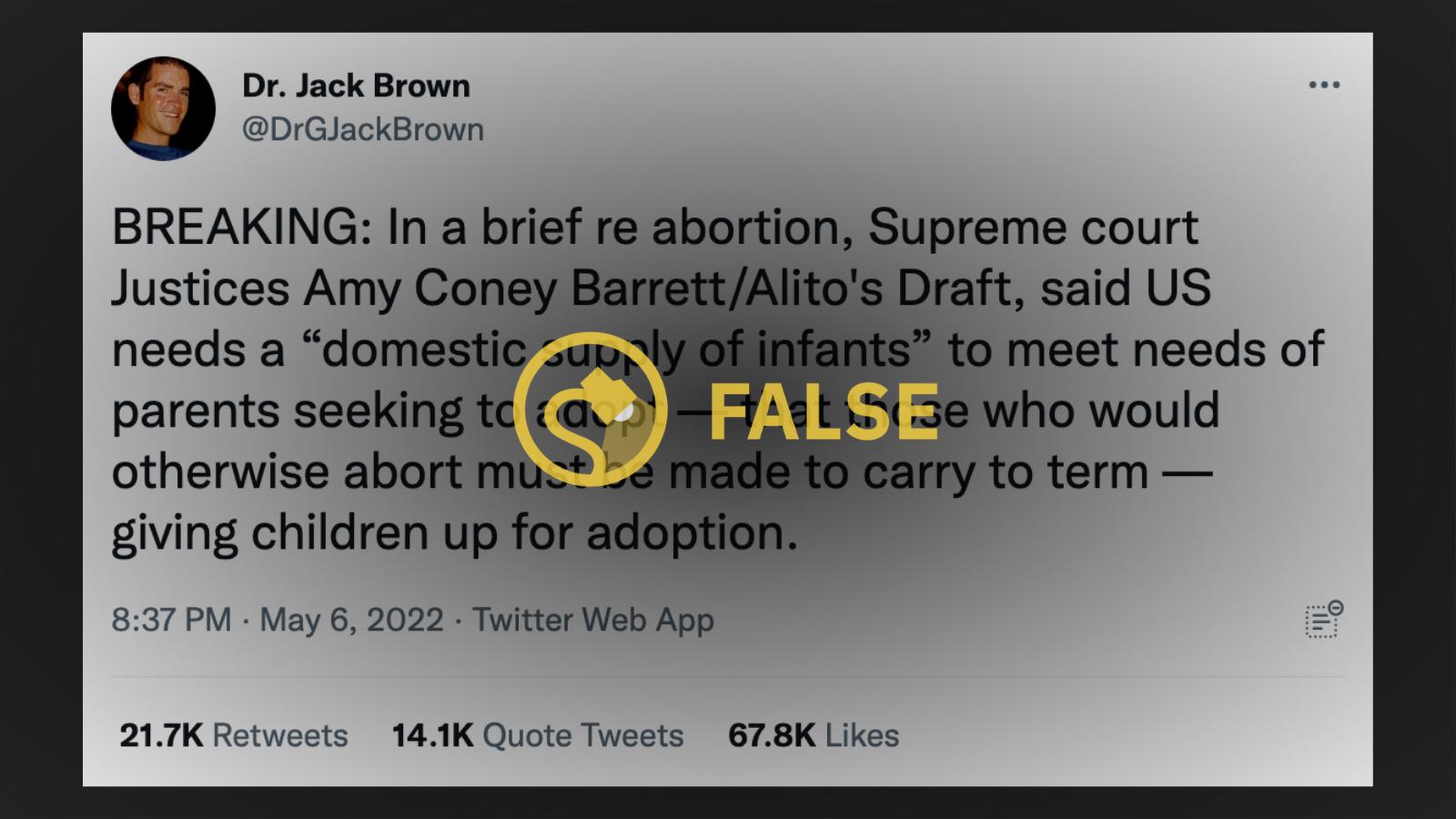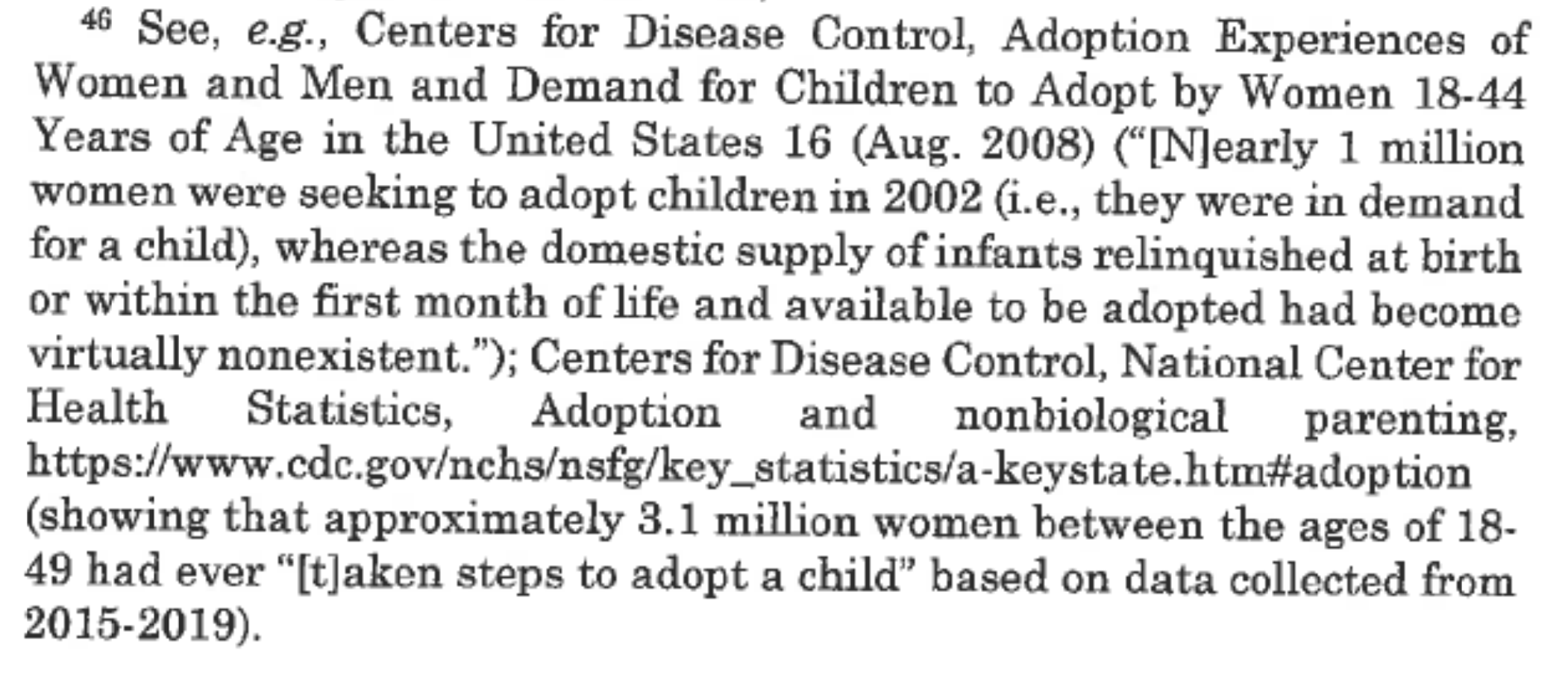Fact Check
In May 2022, as abortion-rights and anti-abortion activists digested and responded to a leaked majority Supreme Court opinion overturning Roe v. Wade, attention turned to what some presented as a callous and inhumane argument for the restriction or prohibition of abortion access in the United States.
For example, on May 6, left-leaning commentator and self-described body language expert Jack Brown tweeted:
BREAKING: In a brief re abortion, Supreme court Justices Amy Coney Barrett/Alito's Draft, said US needs a “domestic supply of infants” to meet needs of parents seeking to adopt — that those who would otherwise abort must be made to carry to term — giving children up for adoption.
In another widely shared tweet, @PaulCogan claimed that:
Conservative Supreme Court Justice Barrett, wrote a brief about abortion. She noted the USA needed a “domestic supply of infants” to meet needs of parents seeking infants to adopt. She argued that mothers must birth their baby & give it up for adoption to meet market demands.
And @tnicholsmd wrote:
When a Supreme Court Justice writes that abortion should be outlawed for the purpose of generating an increased “domestic supply of infants” to meet needs of parents seeking infants to adopt, we aren’t exaggerating by stating that they want you to be brood mares for the state.
@Stonekettle similarly claimed that the conservative justices in the majority had cited the "domestic supply of infants for adoption" as "justification for taking away your right to your own body," and @LadyJayPersists described the argument in the brief as "forced pregnancy in order to add to a 'domestic supply of infants' for adoption."
These tweets grossly misrepresented, or fundamentally misunderstood, the contents, context, and function of a footnote from the leaked draft opinion. None of the justices, including Samuel Alito and Amy Coney Barrett, made the argument that abortion should be banned or restricted for the purpose of creating, maintaining, or increasing a "domestic supply of infants." Our rating is therefore "False."
Where Did 'Domestic Supply of Infants' Come From?
The document whose leaking set off a firestorm in May 2022 was a draft majority opinion, written by Alito, in the case of Dobbs v. Jackson Women's Health Organization, which revolved around Mississippi's 15-week abortion ban.
In it, the majority explicitly overruled Roe and Planned Parenthood v. Casey, a landmark 1992 case in which the court substantially reaffirmed the central hold in Roe, namely that the U.S. Constitution — in particular the Due Process Clause of the 14th Amendment — acknowledges and protects a fundamental (but not absolute) right to an abortion, as part of a broader fundamental right to privacy.
Alito's draft opinion attacked that principle, which is essential to Roe, and stated:
We hold that Roe and Casey must be overruled. The Constitution makes no reference to abortion, and no such right is implicitly protected by any constitutional provision, including the one on which the defenders of Roe and Casey now chiefly rely — the Due Process Clause of the Fourteenth Amendment.
'Important Policy Arguments' Should Be Weighed by 'the People and Their Elected Representatives'
The draft opinion also recommended that the legal status of abortion should henceforth be left to lawmakers — federal and state — to decide ("It is time to heed the Constitution and return the issue of abortion to the people's elected representatives"), even though both opponents and supporters of abortion rights have made what the draft describes as "important policy arguments":
Both sides make important policy arguments, but supporters of Roe and Casey must show that this Court has the authority to weigh those arguments and decide how abortion may be regulated in the States. They have failed to make that showing, and we thus return the power to weigh those arguments to the people and their elected representatives.
Here's how Alito's draft summarized the "important policy arguments" made by both sides.
First, "defenders of Roe and Casey":
- "Do not claim that any new scientific learning calls for a different answer to the underlying moral question," but;
- "They do contend that changes in society require the recognition of a constitutional right to obtain an abortion." For example:
- "Without the availability of abortion, they maintain, people will be inhibited from exercising their freedom to choose the types of relationships they desire"
- ["Without the availability of abortion], women will be unable to compete with men in the workplace and in other endeavors."
Meanwhile, "Americans who believe that abortion should be restricted ... note that":
- "Attitudes about the pregnancy of unmarried women have changed drastically"
- "Federal and state laws ban discrimination on the basis of pregnancy"
- "Leave for pregnancy and childbirth are now guaranteed by law in many cases"
- "The costs of medical care associated with pregnancy are covered by insurance or government assistance"
- "States have increasingly adopted 'safe haven' laws, which generally allow women to drop off babies anonymously"
- "A woman who puts her newborn up for adoption today has little reason to fear that the baby will not find a suitable home"
- "Many people now have a new appreciation of fetal life and ... when prospective parents who want to have a child view a sonogram, they typically have no doubt that what they see is their daughter or son."
Remember, those are not arguments or claims that Alito or anyone else on the majority is making. Those are arguments made by others, but listed in Alito's draft opinion as representative of the most up-to-date policy positions on either side of the great moral and legal debate over abortion.
One can quite legitimately dispute the fairness and representativeness of Alito's lists of "important policy arguments," but it cannot reasonably be asserted that these are arguments Alito himself is making.
Adoption and the 'Domestic Supply of Infants'
The argument about adoption is as follows:
Historically, one reason why a woman who was not in a position to care for a child might have chosen to access an abortion, rather than choosing to give birth and place the baby for adoption, was that she was concerned the child would not be properly cared for in the adoption system.
However, in recent years the number of would-be adoptive parents has far exceeded the number of infants placed for adoption, which increases the likelihood of a stable and loving family environment being found for any given baby, thus undermining the relevance of the "adoption fear" basis for abortion, as outline above.
In order to explain this point, Alito's draft opinion included a footnote that cited an August 2008 report published by the federal U.S. Centers for Disease Control and Prevention (CDC), as well as some CDC statistics on adoption:
The footnote also quoted from the 2008 CDC report, as follows:
Nearly 1 million women were seeking to adopt children in 2002 (i.e., they were in demand for a child), whereas the domestic supply of infants relinquished at birth or within the first month of life and available to be adopted had become virtually nonexistent.
Some readers might quite reasonably find it jarring to see the language of "supply and demand" — more commonly seen in the context of markets — being used in a federal government report about adoption.
However, this is not what several viral social media posts said in May 2022. They said, specifically, that Alito and other conservative justices had themselves argued for the prohibition of abortion access, in order to increase or protect the "domestic supply of infants" made available for adoption. That claim fails in the following ways:
- The draft opinion did not make the argument about adoption, it cited it as one of several "important policy arguments" frequently made by opponents of Roe, Casey, and abortion rights
- A key point in the draft opinion was to stipulate that the evaluation of such policy arguments should not be a function or role of the Supreme Court. Thus, the opinion not only did not state a view on the adoption argument, it explicitly renounced its own stating a view on it
- As articulated in the draft opinion, the argument about adoption was not that abortion should be banned in order to increase the number of infants available for adoption, but that the ample availability of qualified would-be adoptive parents meant women considering abortion over adoption should not be concerned that any child to whom they give birth will not be given a suitable and loving home
- The phrase "domestic supply of infants" — the wording of which gave rise to considerable opprobrium — came from a 2008 CDC report included in a footnote, and not the main, original body of the draft opinion itself




